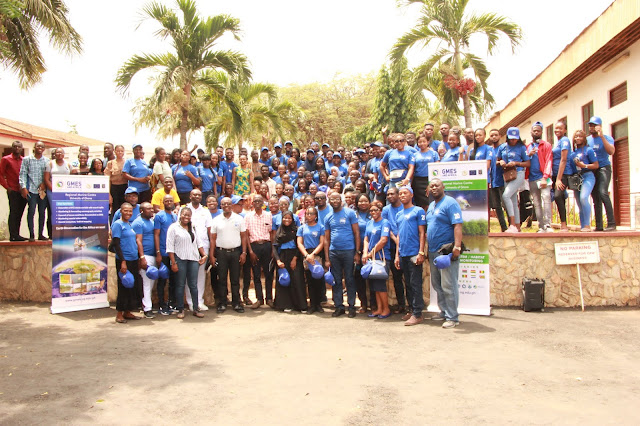Establish Open Source Clubs In Universities_ UG-GMES Coordinator
Establish Open Source Clubs in Universities_ UG-GMES Coordinator
Director for Global Monitoring for Environment
and Security and Africa (Marine) project in West Africa, Prof. George Wiafe has called for the
establishment of open source clubs in all the twelve ECOWAS countries, starting
with the University of Ghana.
 |
| Prof. George Wiafe, Project coordinator of GMES and Africa (marine) in West Africa, addressing the workshop participants |
The establishment of these clubs he believes
will serve as a capacity-building avenue for students and will better equip
them to exploit the benefits from the blue economy agenda. It will further
leverage the competition between students from Africa and the rest of the
world. The club has been created at the Department of Marine and Fisheries Sciences
at the University of Ghana, with about 80 members so far.
He made this call during a joint workshop
between the marine and fisheries sciences departments of the University of
Ghana and the University of Lagos. The joint workshop was supported by the Marine
and Coastal Areas Management in western Africa project implemented by the
Regional Marine Centre.
The workshop themed, “West Africa’s blue
economy: building the capacity of the next generation” had in attendance, over
one hundred marine and fisheries science students and senior lectures from the
University of Ghana and the University of Lagos.
 |
| Group picture of workshop participants, 26th February 2020 |
The European Commission defines the blue
economy as all economic activities related to oceans. Hitherto, how everyone can come together to benefit from the ocean’s
resources. Although the west African maritime domain
continues to be rich in natural resources including fish, hydrocarbon deposits
and an important global shipping route, it continues to be saddled with a
myriad of challenges. Piracy, armed robbery at sea, the proliferation of
illicit trade, drug and weapon trafficking are among the many activities
affecting the maritime domain.
Delivering the address on the challenges
confronting west Africa’s blue economy, Lieutenant at the Ghana Navy, Joshua
Agbenyenu revealed, Nigeria recorded the highest number of incidences at sea
between 2018 – 2019.
“Although piracy attacks have reduced from
previous years, others are still on the rise which is creating an uncomfortable
situation for the shipping industry”, he said. He also
mentioned that if these activities are not curbed, it will spread to other
parts outside of Nigeria.
 |
| Lieutenant Joshua Agbenyenu, Ghana Navy, addressing the workshop participants |
According to Lieutenant Joshua Agbenyenu, there
is the need for a collaborative effort between countries, agencies,
international bodies and programmes such as GMES and Africa to end illicit
activities at sea, since the impact of these activities is enormous.
The Head of Department of Marine Sciences at
the University of Lagos (UNILAG), Dr Minasu Pentho Kuton said the challenges
facing Nigeria’s maritime domain emphasizes the need for the creation of
opensource clubs to help generate interest among the future generation in the maritime
domain and proffer solutions.
He also underscored the importance of the
workshop, saying it will enable the students to understand better, what is
taught in the classroom. “We have field engagements in
Nigeria as well but Ghana seems to have a unique ecological setup which we try
to exploit”, he added.
Dr Minasu Pentho Kuton, HOD Dept. of Marine Sciences at UniLag (in the middle), Prof. George Wiafe, UG-GMES Project Coordinator (at the left) and Dr. Samuel Addo, HOD Dept of Marine and Fisheries Sciences at UG.
The joint workshop between the two universities
is an annual event for students studying marine and fisheries sciences in both
universities and it is hosted by of the Marine and Fisheries Department of the University
of Ghana under the leadership of Dr. Samuel Addo.



Africa is at a cross-roads at the moment. We are very dependent on foreign aid and not investing much in research and development. The youth are eager to leave the shores of Africa to seek greener pastures. This is the time to give them hope. The sort of hope that would make them confident in themselves. On the platform of OPENSOURCE, the student in Africa is comparable to the ivy league chap in Harvard. We are committed to showing the way through our opensource initiative dubbed "EO-Hackers" (i.e. Earth Observation Hackers").
ReplyDeleteThe need for a collaborative effort between Agencies, international bodies and other maritime stakeholders is key in maintaining a safe maritime Domain as well as curbing illicit activities at sea.
ReplyDelete